Related Research Articles

Abdulaziz bin Abdul Rahman bin Faisal bin Turki bin Abdullah bin Mohammed bin Saud, known in the Western world mononymously as Ibn Saud, was an Arab political and religious leader who founded Saudi Arabia – the third Saudi state – and reigned as its first king from 23 September 1932 until his death in 1953. He had ruled parts of the kingdom since 1902, having previously been Emir, Sultan, and King of Nejd, and King of Hejaz.
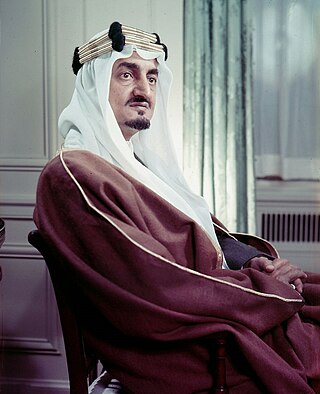
Faisal bin Abdulaziz Al Saud was a Saudi Arabian statesman and diplomat who was King of Saudi Arabia from 2 November 1964 until his assassination in 1975. Before his ascension, he served as Crown Prince of Saudi Arabia from 9 November 1953 to 2 November 1964, and he was briefly regent to his half-brother King Saud in 1964. He was prime minister from 1954 to 1960 and from 1962 to 1975. Faisal was the third son of King Abdulaziz, the founder of modern Saudi Arabia.

Saudi Aramco, officially the Saudi Arabian Oil Group or simply Aramco, is a majority state-owned petroleum and natural gas company that is the national oil company of Saudi Arabia. As of 2024, it is the fourth-largest company in the world by revenue and is headquartered in Dhahran. Saudi Aramco has both the world's second-largest proven crude oil reserves, at more than 270 billion barrels, and largest daily oil production of all oil-producing companies. It is the single greatest contributor to global carbon emissions of any company in the world since 1965.

Khalid bin Abdulaziz bin Abdul Rahman bin Faisal bin Turki bin Abdullah bin Mohammed bin Saud was the king and prime minister of Saudi Arabia from 25 March 1975 to his death in 1982. Before his ascension, he was the crown prince of Saudi Arabia. He was the fifth son of King Abdulaziz, the founder of modern Saudi Arabia.

Saud bin Faisal Al Saud, also known as Saud Al Faisal, was a Saudi Arabian statesman and diplomat who served as the foreign minister of Saudi Arabia from 1975 to 2015. A member of the Saudi royal family, he was the longest-serving foreign minister in world history.

Adel al-Jubeir is a Saudi diplomat serving as the Minister of State for Foreign Affairs since 2018. He also serves as a Member of the Council of Ministers of Saudi Arabia and has been the Climate Affairs Envoy since 2022. Notably, he is the second non-royal to hold the office of the Minister of State for Foreign Affairs, succeeding Ibrahim bin Abdullah Al Suwaiyel. Previously, al-Jubeir was the Saudi Ambassador to the United States from 2007 to 2015 and a foreign policy advisor to King Abdullah.
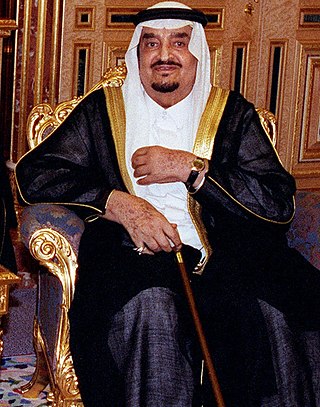
The Sudairi Seven, also spelled Sudairy or Sudayri, is the commonly used name for a powerful alliance of seven full brothers within the Saudi royal family. They are also sometimes referred to as the Sudairi clan or the Sudairi faction. They are among the forty-five sons of the country's founder, King Abdulaziz. The King had more sons with their mother, Hussa bint Ahmed Al Sudairi, than he did with any of his other wives.
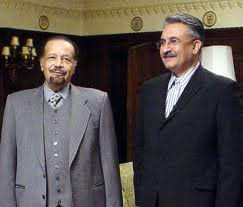
Ahmed Zaki Yamani was a Saudi Arabian politician who served as Minister of Petroleum and Mineral Resources under four Saudi monarchs from 1962 to 1986, and a minister in the Organization of the Petroleum Exporting Countries (OPEC) for 25 years.

Ali bin Ibrahim Al-Naimi is a Saudi Arabian politician who was the Saudi Arabian Minister of Petroleum and Mineral Resources from 1995 to 2016.
Ghazi Abdul Rahman Al Gosaibi was a Saudi politician, diplomat, technocrat, poet, and novelist. He was an intellectual and a member of the Al Gosaibi family that is one of the oldest and richest trading families of Saudi Arabia and Bahrain. Al Gosaibi was considered among Saudi Arabia's topmost technocrats since the mid-1970s. The Majalla called him the "Godfather of Renovation" while Saudi journalist Othman Al Omeir argued that he was "the only great man in Saudi Arabia."
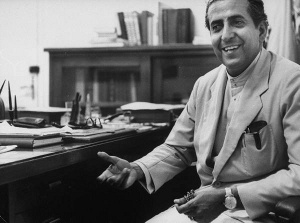
Abdullah Tariki, also known by the alternate spelling of his last name as al-Turayqi and nicknamed the Red Sheikh, was a Saudi politician and government official. He served as the first oil minister of Saudi Arabia, appointed by King Saud, and was co-founder of the Organization of Petroleum Exporting Countries (OPEC).

Romania–Saudi Arabia relations are foreign, economic and cultural relations between Romania and Saudi Arabia. Romania has an embassy in Riyadh and an honorary consulate in Jeddah. Saudi Arabia has an embassy in Bucharest.

Kamal Adham was a Saudi businessman and the director general of Al Mukhabarat Al A'amah from 1965 to 1979. He served as a royal counsellor to both King Faisal and King Khalid.
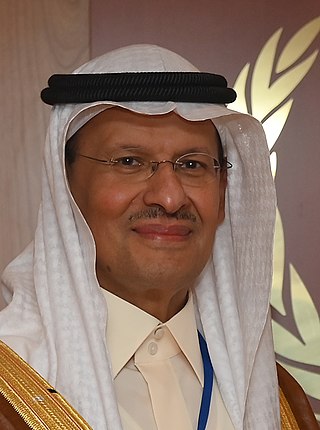
Abdulaziz bin Salman Al Saud is a Saudi royal and politician who has served as the Saudi Arabian minister of energy since September 2019. He is the first royal to serve as energy minister. He was the assistant oil minister of Saudi Arabia between 2005 and 2017. In 2017, he was made state minister for energy affairs.
The modern history of Saudi Arabia begins with the declaration of the unification of Saudi Arabia in a single kingdom in 1932. This period of time in Saudi Arabia's history includes the discovery of oil in Saudi Arabia and many events. It goes on to encompass Saudi Arabia's brief involvement in World War II in 1945. Afterwards, it includes Saudi Arabia's involvement in the Western Bloc and the Cold War. It also includes Saudi Arabia's proxy conflict with Iran, the Arab Spring, and the ongoing Arab Winter.

The Ministry of Energy is a government ministry in Saudi Arabia and part of the cabinet. It is responsible for developing and implementing policies concerning petroleum and related products. The Ministry of Energy is working to diversify the national energy mix used in electricity production, increasing the share of natural gas and renewable energy sources to approximately 50% by 2030 while reducing the use of liquid fuel.
Events in the year 2021 in Saudi Arabia.
Abdullah bin Suleiman Al Hamdan, commonly known as Abdullah Suleiman and also by his nickname Wazīr Kullī Shaīʾ, was the treasurer and long-term as well as first finance minister of Saudi Arabia (1932–1955). He was named "the minister of everything" due to his involvement in nearly all state affairs which included agriculture, transportation and mining resources among the others. During the reign of King Abdulaziz he was the most significant non-royal official.
Abdulaziz Al Muammar (1919–1984) was a Saudi Arabian technocrat who served as one of King Saud's advisors and an ambassador of Saudi Arabia to Switzerland. Besides he is one of the leading figures of the first generation Saudi Arabian intellectuals.
Mustafa Wahba was a Saudi Arabian economist who served as deputy finance minister from 1960 to 1962. In addition, he was the first and long-term secretary general of the Communist Party in Saudi Arabia between 1975 and 1991.
References
- ↑ "Saudi considers Naimi's successor as oil minister". Reuters . London. 10 December 2010. Archived from the original on 3 June 2016. Retrieved 2 December 2012.
- ↑ Steffen Hertog (2011). Princes, Brokers and Bureaucrats. Ithaca, NY; London: Cornell University Press. p. 94. ISBN 978-0-8014-5753-1.
- 1 2 3 4 "Oil chief close to Saudi King". Pittsburgh Post . 31 October 1986. Retrieved 2 December 2012.
- 1 2 3 4 5 Steffen Hertog (2008). "Petromin: the slow death of statist oil development in Saudi Arabia". Business History. 50 (5): 645–667. doi:10.1080/00076790802246087. S2CID 154116939.
- 1 2 3 Ibrahim AlMuhanna (2022). Oil Leaders. An Insider's Account of Four Decades of Saudi Arabia and OPEC's Global Energy Policy. New York; Chichester, West Sussex: Columbia University Press. pp. 37, 42. doi:10.7312/almu18974. ISBN 9780231548496. S2CID 249323758.
- ↑ "Saudis fire Yamani as oil minister". Spokane Chronicle. 30 October 1986. Retrieved 7 January 2013.
- ↑ Paul Reed Baltimore (2014). From the camel to the cadillac: automobility, consumption, and the U.S.-Saudi special relationship (PhD thesis). University of California, Santa Barbara. p. 204. ISBN 978-1-321-34912-2. ProQuest 1638271483.
- 1 2 John Tagliabue (21 December 1986). "Crisp, no nonsense, Saudi's acting oil minister makes debut". Houston Chronicle Archives. The New York Times . Retrieved 4 December 2012.
- ↑ "CNES Alumni around the world". UCLA World. Retrieved 4 December 2012.
- 1 2 Saudi Arabia: The Monthly Newsletter of the Royal Embassy of Saudi Arabia. Information Office, Royal Embassy of Saudi Arabia. 1989. p. 7.
- 1 2 3 Jacob Goldberg (1988). "The Saudi Arabian Kingdom". In Itamar Rabinovich; Haim Shakid (eds.). Middle East Contemporary Survey. Vol. 10. Boulder, CO; London: Westview Press. p. 548. ISBN 978-0-8133-0764-0.
- ↑ David G. Edens; William P. Snavely (Winter 1970). "Planning for Economic Development in Saudi Arabia". The Middle East Journal . 24 (1): 17–30. JSTOR 4324550.
- ↑ "New Appointments". Arabian Gulf Digital Archive. 7 February 1968. Retrieved 6 February 2023.
British intelligence document
- ↑ Nizar Madani (1977). The Islamic Content of the Foreign Policy of Saudi Arabia. King Faisal's Call for Islamic Solidarity 1965-1975 (PhD thesis). American University. p. 54. ProQuest 302841281?.
- ↑ David E. Long (Winter 1979). "Saudi Oil Policy". The Wilson Quarterly . 3 (1): 85. JSTOR 40255563.
- 1 2 3 4 Khaled Al Shaei (8 February 2011). "Calls for penalizing Saudi ambassador to Egypt". Al Arabiya . Riyadh. Retrieved 2 December 2012.
- 1 2 Hasan Mansur (March 2001). "The Emperor without Clothes". Islamic Voice. 15 (171). Archived from the original on 28 March 2018. Retrieved 4 December 2012.
- ↑ "9 billion Arabian city of 200,000 to be built". St. Petersburg Times. San Francisco. AP. 25 June 1976. Retrieved 2 December 2012.
- ↑ "Sheikh Ahmed Zaki Yamani, the most powerful figure". UPI. Kuwait. 29 October 1986. Retrieved 16 November 2015.
- ↑ "King Reportedly to Make Nazer Permanent Oil Minister". Associated Press . Dhahran. 23 December 1986. Retrieved 4 December 2012.
- 1 2 "Hisham Nazer Named Head of Saudi Oil Firm". Los Angeles Times . 7 April 1988. Retrieved 2 December 2012.
- ↑ John West (11 November 1986). "Yamani ouster signals shift in oil policy". The Palm Beach Post . Archived from the original on 14 February 2020. Retrieved 2 December 2012.
- ↑ "New Saudi Oil Minister Appointed". Philly. Inquirer Wire Services. 25 December 1986. Archived from the original on 18 October 2015. Retrieved 4 December 2012.
- ↑ "Key ministers fired as king cleans house". Eugene Register Guard. Riyadh. AP. 3 August 1995. Retrieved 2 December 2012.
- ↑ Arthur Clark (September–October 1993). "Saudi Aramco at Sixty". Aramco World . 44 (5).
- ↑ "Saudi Named Aramco Chief". The New York Times. AP. 7 April 1988. Retrieved 31 December 2012.
- 1 2 "From Aramco to Saudi Aramco 1985-1990" (PDF). Saudi Aramco. Archived from the original (PDF) on 15 November 2012. Retrieved 31 December 2012.
- ↑ The Middle East and North Africa 2003. London; New York: Europa Publications. 2003. p. 947. ISBN 978-1-85743-132-2.
- 1 2 3 Peter W. Wilson; Douglas F. Graham (1994). Saudi Arabia: The Coming Storm. New York: M.E. Sharpe. p. 210. ISBN 978-1-56324-395-0.
- 1 2 "Kattan named new ambassador to Egypt". Arab News . 28 February 2011. Retrieved 2 December 2012.
- ↑ "Saudi King sacks Egypt envoy after media criticism". Emirates 24/7 . 1 March 2011. Retrieved 2 December 2012.
- ↑ Peter Hobday (1986). Saudi Arabia Today. An Introduction to the Richest Oil Power (2nd ed.). London: The Macmillan Press. p. 78. doi:10.1007/978-1-349-03214-3. ISBN 978-0-333-21471-8.
- ↑ "The High Cost of Change Repression Under Saudi Crown Prince Tarnishes Reforms". Human Rights Watch. 4 November 2019. Retrieved 18 April 2021.
- ↑ Chung In Moon (Autumn 1986). "Korean Contractors in Saudi Arabia: Their Rise and Fall". The Middle East Journal. 40 (4): 624. JSTOR 4327423.
- ↑ Khaled bin Mirdah (15 November 2015). "Hisham Nazer passes away". Saudi Gazette. Jeddah. Archived from the original on 15 November 2015. Retrieved 21 December 2023.
- ↑ "Saudi ex-oil minister passes away". Emirates 24/7. 15 November 2015. Retrieved 16 November 2015.
- ↑ John Duke Anthony (Winter 1979). "Foreign Policy: The View from Riyadh". The Wilson Quarterly. 3 (1): 74. JSTOR 40255562.
- 1 2 "A wake-up call by Hisham Nazer". Arab News. 2 October 2002. Retrieved 2 December 2012.
- ↑ "AUC Honorary Degree Recipients". American University in Cairo. Archived from the original on 24 February 2013. Retrieved 7 January 2013.
